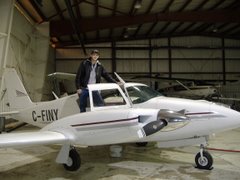Airplane is finally fixed, and I had a training flight today, more booked for tomorrow. The crunch time is really on now because I have only six weeks until my INRAT exam expires.
Today we did a quick review of VOR holds, then did some localizer holds, and finished with an ILS approach. To be honest I'm having a pretty tough time. It feels like it takes me a long time to grasp even a little of what we're covering, while the rest of it goes right over my head. Its been a while since I've felt this dumb. I'm both amazed at and thankful for my instructor's patience. He'll calmly walk me through each step over and over again, and never gets upset or impatient that its taking me so long to catch on.
I do feel like I am making progress though, bit by bit, but I was hoping I would catch onto things much quicker than I am. The airplane is still causing frusteration however. The #1 VOR was replaced last year, and its a brand new unit, however it was doing funny things today. For some reason it refused to pick up the Morse code idents for the London VOR. It worked fine for every other VOR however. Finally once we were back on the ground we checked it again and it worked fine. Ghosts in the machine I guess. Those are the worst kinds of problems, where sometimes it works, other times it doesn't. We tried every possible combination of settings on the audio panel and the instrument, but we couldn't manage to figure out why we couldn't hear the Morse code audio. Its especially frusterating because not only does trying to troubleshoot those problems in the air take away from the training experience, its a brand new unit, so in theory it should work perfectly. The best we can do is cross our fingers and hope for the best tomorrow.
A part of me wants to go crawling back into the comfortable world of VFR flying and forget about advancing into the IFR realm. VFR doesn't take any effort for me anymore, its home for me, but I know that it'd be a mistake to limit myself like that. Not only because an IFR rating opens up better jobs with better pay, but because the longer I put off IFR training the more I become entrenched in VFR flying and the harder it would be to learn IFR later on.
That being said, there's been a couple job possibilities coming over the horizon for me this summer in the fire-patrol sector. I've always wanted to do that, either water-bombing or bird-dogging. Those are both VFR jobs, and I could see myself doing something like that for a while. I did some research today just out of curiosity to learn a little more about those jobs, and here's the short explanation of how I understand it for my readers who are also uneducated in the subject. Its all very cool.
Aerial fire-fighting is divided into 3 different "units" we'll call them. There's Fire Detection, Bird-dogs, and the Water Bombers themselves. The first, which is what I would start out doing if I end up getting a job in the fire-fighting field this year, is called Fire Detection. From what I gather its essentially what it sounds like. Small aircraft, like a Cessna 337, patrols a large area of wilderness with forest-fire potential looking for fires. If a forest fire is spotted, it calls in a Bird-dog aircraft. The Bird-dog aircraft essentially takes command of the entire operation. It will fly over the area and a fire-expert on board the aircraft will assess the forest fire and develop the attack plan for the water bombers, such as the best places to drop the water loads based on the winds and conditions for best control of the fire. Since water bombing is done at tree-top altitudes, the Bird-dog aircraft will then fly the low-altitude bombing route that the water bombers will fly, to note any obstacles that could prevent a hazard to the bombers. We're talking flying over fires and past smoke at 200 ft above the ground, cool stuff. After the bombing runs have been safely tested by the bird-dog, the bird-dog will then climb up higher and orbit the area to call in the water bombers. Since the airspace near a forest fire can naturally become very busy due to the boming activity, the bird-dog's next responsibility will be to act as Air Traffic Control for the water bombers conducting their runs, coordinating everything to make sure aircraft are kept safely apart during operations as well as monitoring the progress of the operation. At least thats my understanding of how things go, I'd love to hear the comments of any readers who have real experience doing this. I've always thought its sounded like a pretty fun job. All a very coordinated team excercise. As for me, we'll see how things pan out.
Subscribe to:
Post Comments (Atom)




Hi Chad. Really enjoy your posts - have read them all over the past few weeks. The fire control business sounds like Vietnam in peace time - the FAC "bird-dog" identifying the target(s) and controlling the bombers or ground attackers onto it. Cool!! Good luck on the IFR, by the way.
ReplyDeleteThanks for the compliment :). Haha, ya it does sound very Vietnam-esque.
ReplyDeleteNice fill someone in on and this post helped me alot in my college assignement. Thank you on your information.
ReplyDelete